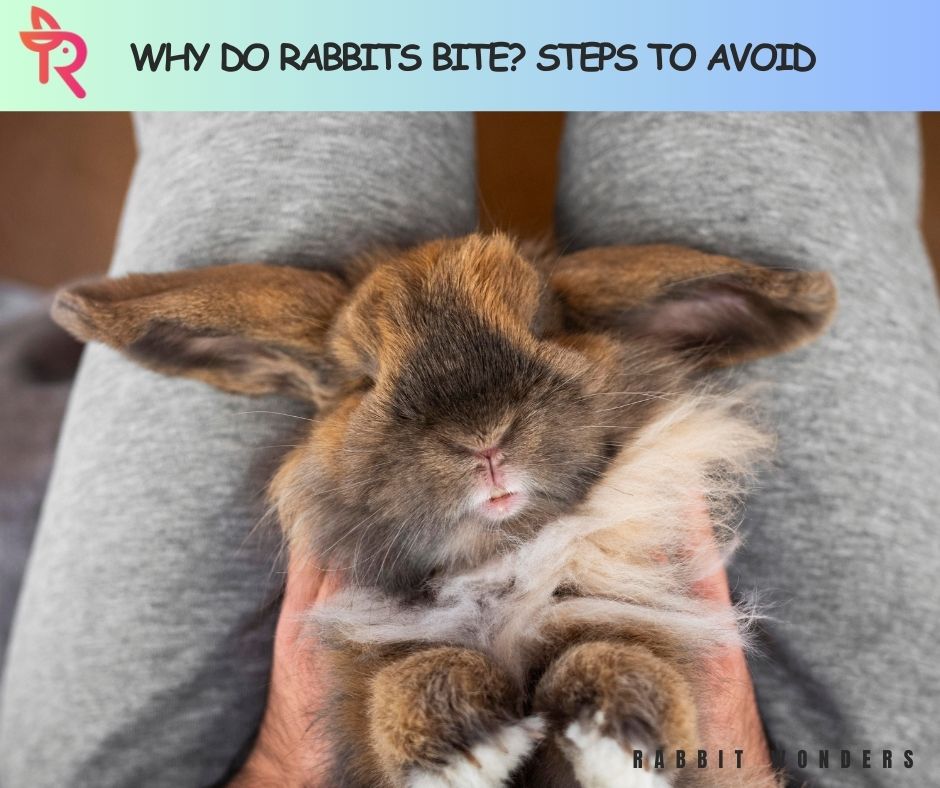Rabbits are beloved for their gentle and docile nature, but there are occasions when these fluffy creatures may resort to biting. Understanding “why do rabbits bite” is essential for responsible pet ownership and ensuring a safe and harmonious relationship with your furry friend. In this guide, we’ll explore the reasons behind rabbit biting and provide valuable steps to help you prevent and manage this behavior, ensuring the well-being of both you and your beloved bunny.
Do rabbits bite humans?
Yes! So, do rabbit bites hurt? Rabbit bites are not aggressive like dogs or cats, but rather a form of communication or reaction to fear or discomfort, which is a part of essential rabbit facts. To prevent bites, approach rabbits calmly, respect their space, provide proper socialization, and seek veterinary care if necessary. Building trust through positive interactions is crucial for a bite-free relationship with your pet rabbit, as it is not as common as with other animals.
Why Do Rabbits Bite? Understanding the Causes
Bunny bites are not random aggression, but rather messages from your rabbit’s feelings, needs, and instincts. Understanding these messages and taking proactive steps to prevent biting can ensure a loving bond with your rabbit, allowing you to navigate interactions confidently and empathically.
Here are some common reasons why do rabbits bite:
- Fear or Stress: Fear in rabbits can trigger them to bite as a defensive response, often due to sudden movements, loud noises, or unfamiliar surroundings.
- Territorial Behavior: Rabbits are territorial creatures that may bite to defend their personal space, particularly when they feel cornered or crowded.
- Pain or Discomfort: A rabbit bite when touched in sensitive areas due to pain, discomfort, illness, injury, dental issues, or other health problems.
- Hormonal Changes: Unspayed rabbits can display aggressive behavior during mating season, with biting potentially being a part of their hormonal-driven behavior.
- Lack of Socialization: Unsocialized rabbits may exhibit fear and aggression due to their lack of exposure to human interaction and their defensive reactions.
- Communication: Rabbits use gentle nips as a communication tool, such as grabbing attention or expressing dissatisfaction with something.
- Playfulness: Young rabbits may exhibit playful nipping, and nibbling on fingers or clothing during play, but this behavior is usually not aggressive.
Understanding ‘why do rabbits bite’ is crucial for building a healthy, trusting relationship with your pet. Recognizing the underlying causes of pet rabbit biting allows you to prevent and address it, ensuring a harmonious bond with your furry companion.
Ways to stop your rabbit from biting
Why does my bunny bite me? Stopping your bunny from biting requires patience, consistency, and an understanding of the underlying reasons for the behavior. Here are some effective ways to discourage your bunny from biting:
Socialization and Trust-Building:
Spend quality time with your rabbit to build trust and establish a strong bond, including gentle petting, offering treats, and softly speaking. This makes your rabbit less likely to bite.
Respect Their Space:
Rabbits are sensitive to their personal space, so approach them calmly, and avoid sudden movements or loud noises. Give them space to initiate contact when comfortable.
Proper Handling Techniques:
Handle your rabbit correctly by supporting their hindquarters, being gentle, and avoiding squeezing or restraining them too tightly when picking them up.
Observation and Understanding:
Observe your rabbit’s body language and learn to recognize signs of stress, fear, or discomfort, which may shed light on “why do rabbits bite.” Such as thumping, growling, or flattening of ears, and provide space for your rabbit to calm down.
Spaying or Neutering:
Consider spaying or neutering your rabbit if it’s not already done to reduce hormonal aggression, increase docility, and reduce biting risk.
Provide a Safe Environment:
Rabbit-proof your home to prevent fear-based biting by ensuring it’s free from hazards like exposed cords, toxic plants, and chewing objects.
Regular Health Checks:
Regularly schedule veterinary check-ups to ensure your rabbit’s health and promptly address any medical issues to prevent biting due to pain or discomfort.
Positive Reinforcement:
Utilize positive reinforcement techniques to encourage good behavior in your rabbit, such as offering treats and praise when they interact gently and friendlyly with you.
Professional Guidance:
If your rabbit is persistently biting despite your efforts, seek advice from a veterinarian or experienced behaviorist to understand the specific reasons behind the behavior, including “Why do rabbits bite.”
Each rabbit is unique, and building a trusting and bite-free relationship may take time and patience. By following these steps and being attentive to your rabbit’s needs, you can create a loving and harmonious environment for both of you.
Are rabbit bites dangerous?
Not much, but rabbit bites can cause infections due to the introduction of bacteria into the wound. Immediate first aid, medical attention, and a tetanus shot are essential steps to prevent infection. Monitor the wound for signs of rabbit bites infection, and if antibiotics are prescribed, complete the full course. Rabies risk should also be considered, especially if the rabbit exhibits unusual behavior or vaccination status.
Wrapping Up
Understanding why do rabbits bite and taking proactive steps to prevent it is crucial for maintaining a happy and harmonious relationship. By following these guidelines, you can create a safe environment and build trust. As rabbit owners, it’s our responsibility to respect their boundaries, provide proper care, and be attentive to their cues. Patience and consistency are key to preventing biting and nurturing a positive connection. Observing body language, offering positive reinforcement, and seeking professional guidance can help.

